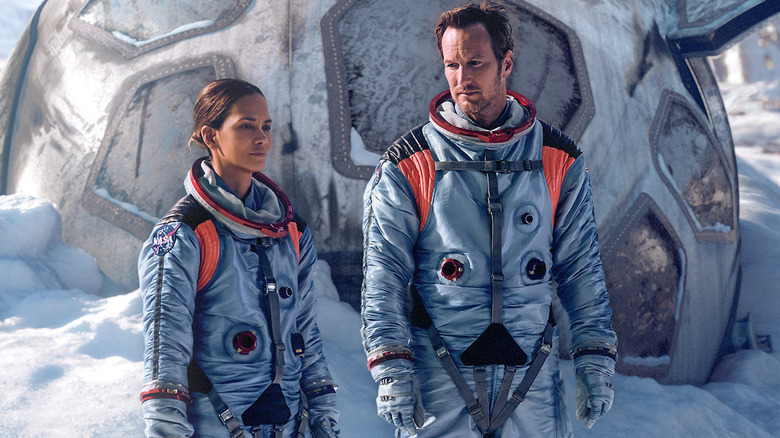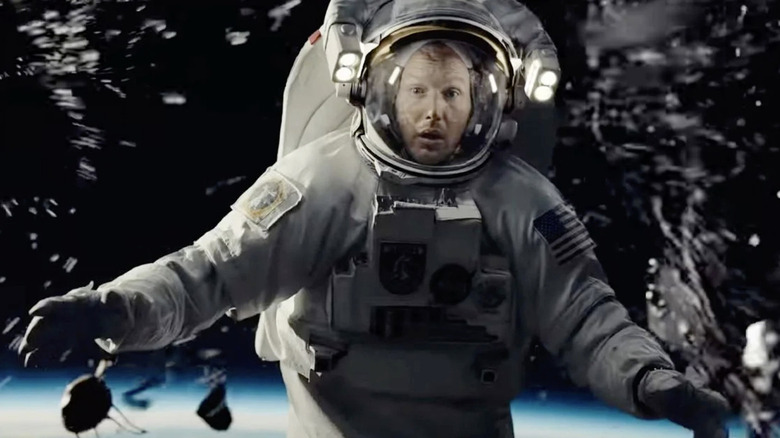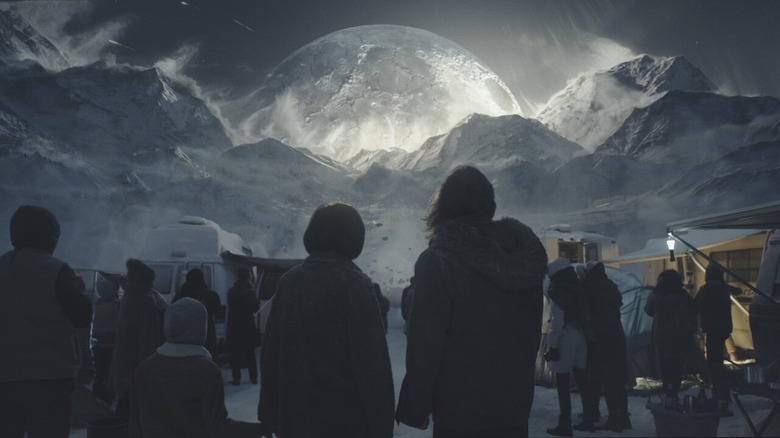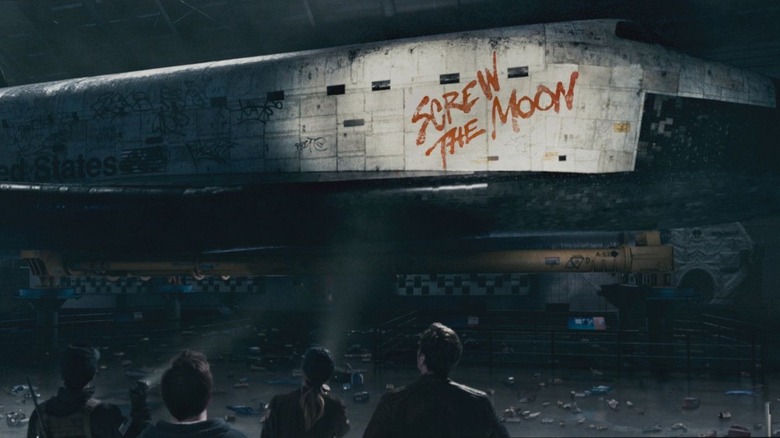Moonfall Director Roland Emmerich On Smuggling Science Fiction Into A Disaster Movie [Interview]
"Moonfall" isn't quite the movie you think it is.
Okay, yes — it's a movie where the Moon is falling to Earth, causing all kinds of chaos and destruction as an ensemble of puny humans tries to save their very existence. This is a film from director Roland Emmerich, after all. The man made "Independence Day," "The Day After Tomorrow," and "2012." He knows a thing or two about orchestrating cinematic mass destruction. But Emmerich is also a science fiction fan, one who is happy to namedrop some of the classics when you talk to him, and "Moonfall" is clearly a movie from a guy who read a bunch of Arthur C. Clarke and then said, "Yes, let's do that, but add some scenes where entire cities are destroyed by a falling moon."
Ahead of the release of "Moonfall," I spoke with Emmerich over Zoom to talk about his new movie, his love of science fiction, smuggling his wildest ideas into a crowd-pleasing blockbuster, and his inherent cynicism about the future of non-franchise filmmaking.
"It's never good to make fun of your movies."
I had a blast with "Moonfall," but one thing that kept sticking with me is that it's not the movie that's being sold. The trailers are all about the mass destruction, but that's just the dressing for some wild hard sci-fi elements.
The whole marketing part is super-complicated. I hate movies where you have a feeling you saw the whole film, you know what I mean? And then it's always like ... give glimpses of something, but maybe not the wide room. Not this, not that. So I totally agree with Lionsgate, where they went with the marketing, because for me, it was important that the movie doesn't take itself too seriously. That's always, for me, something which I really, really insist on.
All of your movies have a sense of humor. They're all goofy, but your storytelling and your characters don't feel like they're in on the joke. The humor always comes from a way that feels natural.
Yes. Yes. I mean, it's never good to make fun of your movies. [Humor] always comes naturally out of the character and, most of the time, the conflict between characters, and that they don't believe each other at the beginning, and then they start to believe. This time we have a conspiracy theorist who believes megastructures are out there in the world, or in the universe, for the whole film. And that was kind of just fun for me, because I think John Bradley did a really great job. That was actually something I always liked. And then we have this more emotional story with Halle Berry and Patrick Wilson, [and] with their kids, as an extra kind of storyline.
John Bradley is really funny in this movie. I know him from "Game of Thrones," of course, where he just played such a sad, miserable character. So it was fun to see him cut loose here. Can you talk about working with him to make a character like that? He's the film's heart in many ways.
He's such an amazing actor, and he brought so much heart to it. And I always like that he feels like he has intelligence. You know what I mean? There's nothing really forced about it. We made him, on the other hand, also a little bit sad, because he always wants to have his mom know that he did something great.
I also want to touch on Patrick Wilson. He reminds me of ... Well, here's a strange jump back in time, but I always loved how Peter Cushing, in the '50s and '60s, would appear in all these horror movies, all these genre movies, and would take them so seriously. He would lend credence to how the movie felt. You bought it because he clearly was selling it. And I think Patrick Wilson, in a lot of horror movies, the superhero movies, and now "Moonfall," he feels like a modern version of that, an actor who is so reliably straight-faced that you buy anything absurd because he's telling you.
Yes, yes. I learned that actually when we shot "Midway," you kind of really listen to him. You know what I mean? It's very rare that you find an actor you really listen to. And so that was one thing. And then he is such an amazing actor, and he does it with so little, you know what I mean? ... It's just like, you believe this guy, whatever he says.
"If you go inside the moon, you better have the goods, you know what I mean?"
Patrick Wilson and Halle Berry have a great working relationship in the movie. I love that the movie doesn't try to force a romance.
Yeah. They're just friends, and they're totally okay with it. And it's also not about that, anyway. This is about the Moon falling to Earth. Right? Any love story would kind of make no sense.
I mean this as high praise, so please take it that way: "Moonfall" is like if Arthur C. Clark wrote "Fast and Furious." Can you talk about some of your influences? I saw a lot of "Childhood's End" going on there.
I'm a big science fiction buff. I read pretty much all the major science fiction novels, and yes, it has a little Isaac Asimov, it has a little bit of "2001: A Space Odyssey" in it. And it has just a huge story because if you go inside the Moon, you better have the goods, you know what I mean? If you don't have the goods...
Apple TV+ released their streaming adaptation of Asimov's "Foundation" last year and what I like about that series is that it's based on novels that are really complex, really hard science fiction. So it keeps the ideas, but adds action, romance, and scale, so people kind of get smuggled in to watch it. Was that your approach for "Moonfall"?
Exactly. I'm relatively famous for doing movies like "Independence Day," "Day After Tomorrow," "2012." And they all have this disaster element, which is kind of an easy sell. And then I'm the kind of person who then says, okay, let's put some real science fiction stories in there and come up with this whole thing where there is more to it than it seems. And on the side, we are like, "Also the Moon is falling to Earth," which is nearly a side story in a way, because it is a side story.
There are two main narrative thrusts here. The astronauts up in space solving a sci-fi mystery, and the people on Earth surviving mass destruction. You let these characters discover, learn, and explore, just when maybe somebody in the audience could use an explosion, you have a car chase back on Earth.
But it was interesting — when we tested the movie, the people loved everything in space. They loved the inside of the Moon. They loved everything about it.
I think "Moonfall" and "Independence Day" both have faith in humanity. They both think we are worth saving. And I'm not sure that's true in "The Day After Tomorrow" and "2012." They have a dark sense of humor saying, well, you're f***ed. Sorry. You deserved it. So what changed here?
Well, "Independence Day" and "Moonfall" have a lot to do with each other. They're from the same kind of cloth. And "Day After Tomorrow" and "2012" were more sarcastic looks at our Earth, and are we really worth saving? That kind of thing. But I have to kind of say, I now feel the need ... I'm just waiting a little bit until the pandemic [has] passed, in two, three years, I want to make a big movie about what will happen to Earth because the effect of climate change is unstoppable. I think we are totally past the breaking point, and there will definitely be effects of that. And let's say in 15, 20 years, there will be hundreds of millions of refugees, and that will change our world totally.
"You want to keep a little bit of hope that things will change."
What kind of movie would that be? Do you envision it as a more realistic down-to-earth thing?
Probably the story of, maybe in Africa, a doctor [from Doctors Without Borders] with his family is friends with the whole hospital, and he's the last one to leave, and he cannot leave without taking these people with him. Because of that, he gets really, really in trouble. And sometimes they have to help him, and he has to help them, but it's more of a travelogue where you kind of see the whole world, in a way, be totally changed.
I feel like every day we're being beaten down, and every day has been really hard. And one thing I liked about "Moonfall" was that even though it presents such mass destruction, and such terror and horror, ultimately it says, "Hey, we're going to get through this." I'm curious to see how you would approach such dire material with that mindset.
You have to figure out the way to do it. The biggest problem, probably, is the ending here, because you want to keep a little bit of hope that things will change.
As a science fiction fan, what do you see as the future of the genre on the big screen? I love how "Moonfall" blends hard sci-fi with a big disaster movie, but I want to know what's next? What's going to be the next big thing in science fiction?
I would love to make a movie of the book "The Forever War," or "Childhoods End" would be also a great film, but I don't think they will be getting made. Maybe as a TV series, I don't know, because people stay away from these single fiction ideas. And then, just as long as they can do Marvel movies, and DC comic movies, and keep going with the "Star Wars" saga, they will be happy. The studios want to make money, and the streamers want to make money. So the only way I can see that is [you have to work] with the streamers, which defeats the purpose of making a movie for a big screen, and then maybe have it only in a couple of theaters playing and then get streamed. So it's difficult. I'm very skeptical [about] where we go from here because it can come back to old movie experiences, swing [fully] back to the movie theaters, but I don't believe that will quite happen.
Well, I think you're right, but I also hope you're wrong.
Me too. Me too. I'm working for the big screen.
"Moonfall" hits theaters on February 4, 2022.



